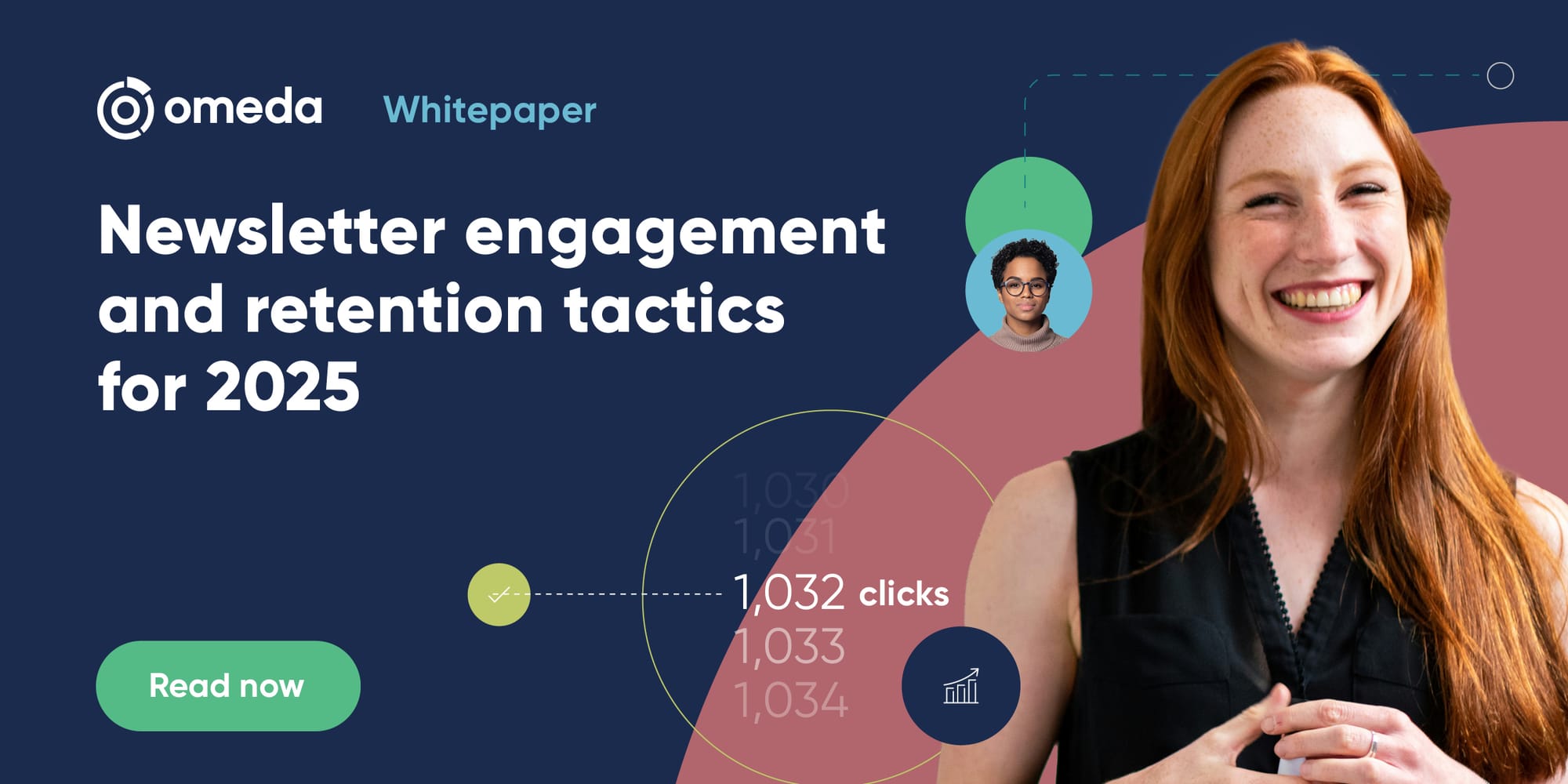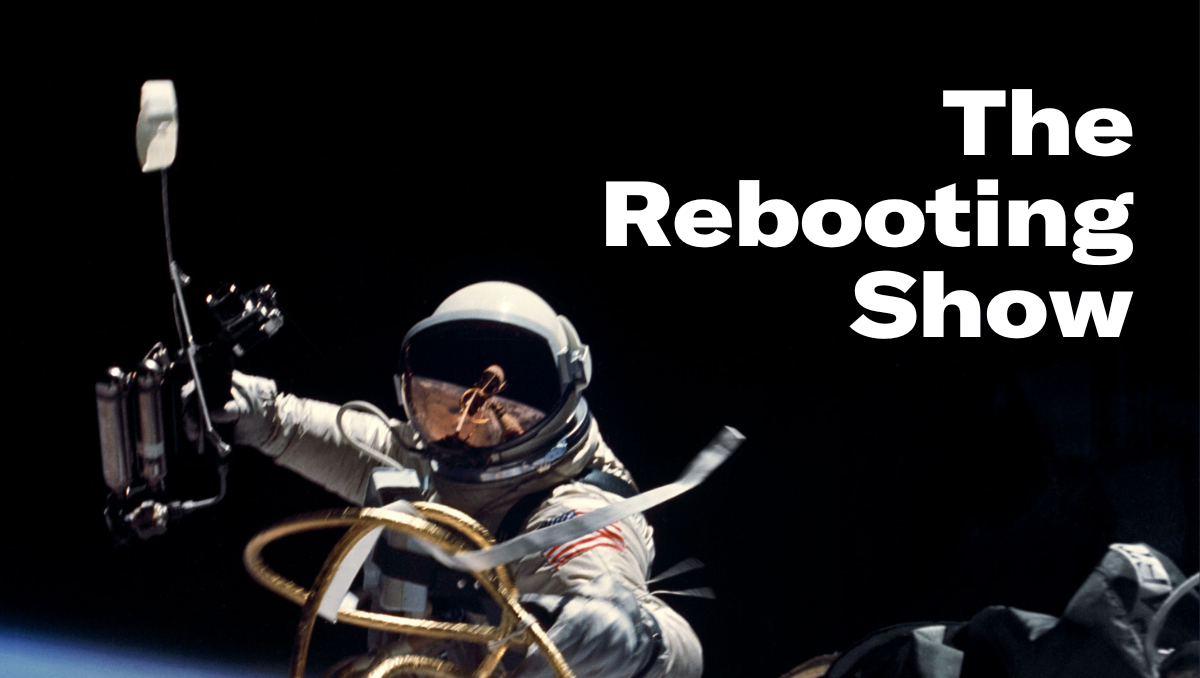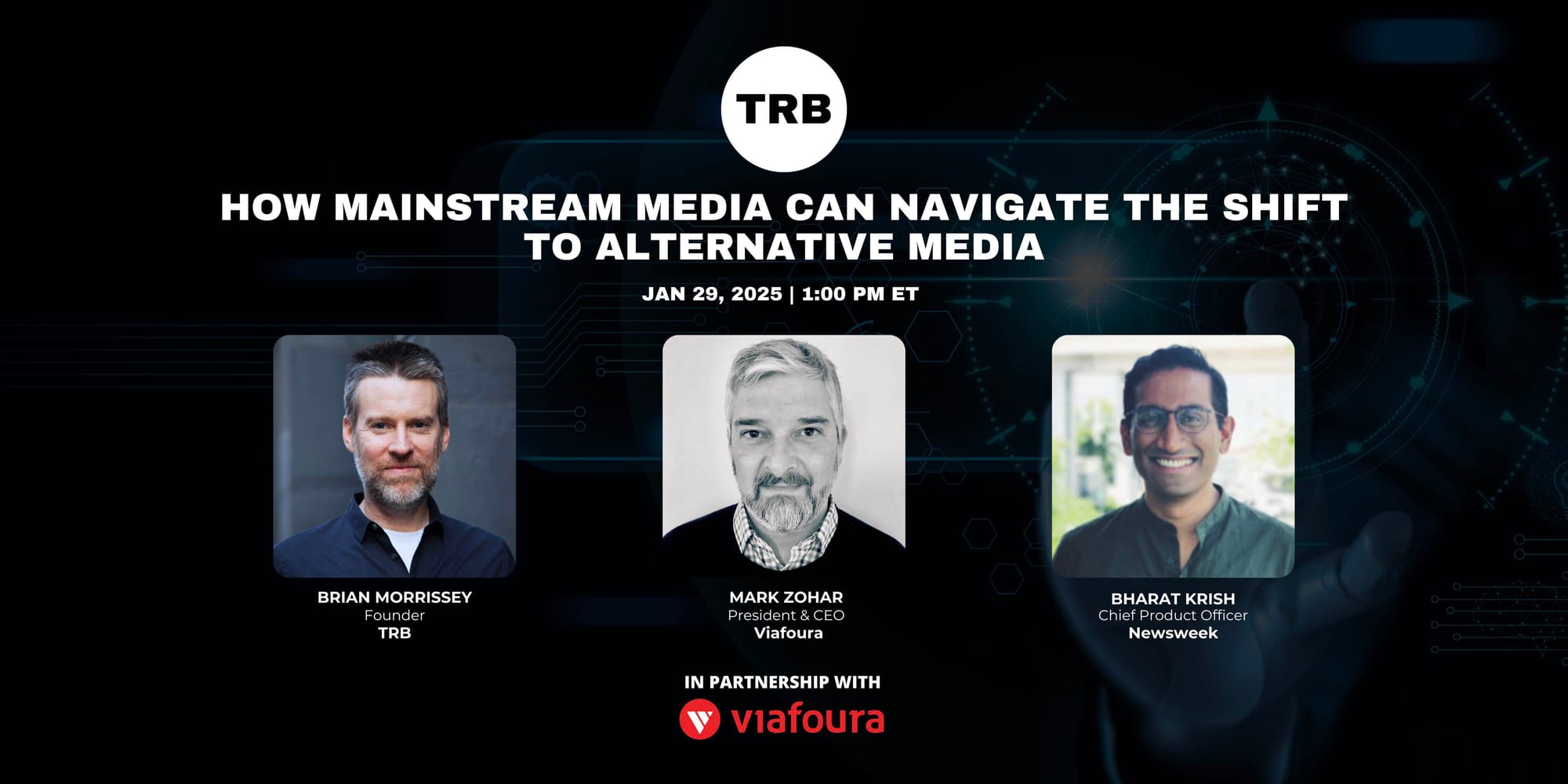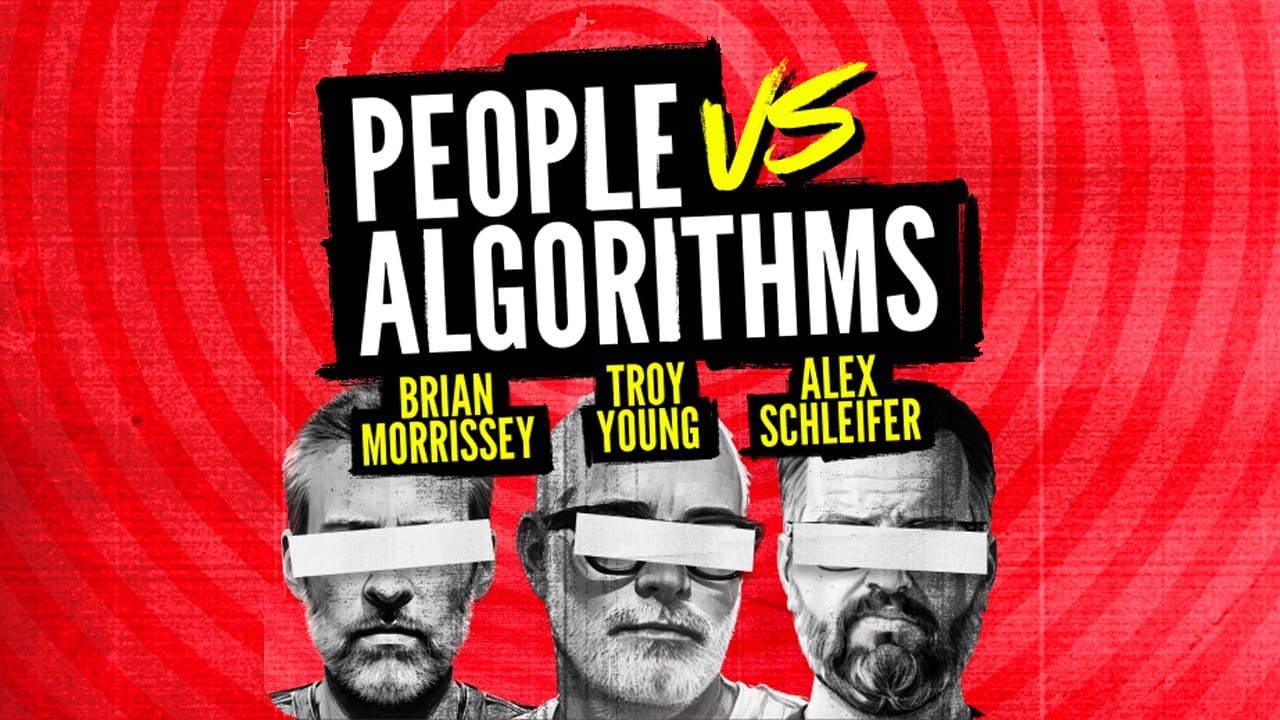Journalism's creator dilemma
Time to take creators seriously

Welcome back. Reminder: Send me a note with feedback and ideas by hitting reply or emailing me at bmorrissey@therebooting.com. In today’s issue:
- Big Technology’s Alex Kantrowitz on Silicon Valley politics, OpenAI’s challenges, X finding a lane
- Free speech, section 230, opportunism
- Sign up for The Rebooting’s next Deep Dive on how established media can harness the power of alternative media
- Journalism’s creator dilemma

Make your newsletters unforgettable

Newsletters are booming, and competition is fiercer than ever. If you’re not delivering engaging, personalized content, you’re falling short—and losing your audience’s trust.
That’s why Omeda created Newsletter Engagement and Retention Tactics for 2025. This must-read ebook is packed with proven strategies to combat newsletter fatigue, drive engagement, and boost revenue—all while building loyal, lasting relationships with your audience.
Don’t just keep up—stand out. Elevate your newsletter game in 2025.
Big Tech in 2025

On this week’s episode of The Rebooting Show, I was joined by Alex Kantrowitz, who writes the Big Technology newsletter and hosts a podcast of the same name, in order to discuss the year ahead in tech platforms. We covered a lot of ground, including:
- The slightly unseemly kowtowing to the incoming Trump administration
- OpenAI’s wonky economics
- Alex’s bet on AI “companions”
- Why X has proved doomsayers wrong
- The bright spot of individual creators amid a lot of media industry gloom
Get The Rebooting Show on Apple | Spotify | other podcast platforms
Check out the Big Technology newsletter and podcast.
Thanks to EX.CO for sponsoring these year-in-preview episodes that will run through January.
Zuckerberg, content moderation, Trump, tradeoffs
I got several notes about Mark Zuckerberg’s reversal on Meta’s content-moderation policies that he implemented. It’s impossible to separate the political jockeying from this move from the merits of the actual decision. They’re completely intertwined.
It’s aligning interests: In our discussion on the latest episode of People vs Algorithms, Alex made a simple but obvious point: This is about Section 230, the pass platforms are given for having responsibility for the content they carry, unlike, say, publishers. As Big Tech has gotten bigger, it’s become more enmeshed with government. U.S. tech companies face steep fines in the EU and strict regulation in Brazil and elsewhere. Zuckerberg noted the fines in his interview this week with Rogan, notably calling them a de facto tariff. Even the biggest companies need governments in order to fight other governments.
“This is not an example of a company suddenly acting irrationally, but of a company rationally responding to one political development so as to facilitate defeating a regulatory challenge,” David Allen Green writes in the FT.
The hypocrisy angle: One TRB reader has no time for the free speech framing. “It would be great if we didn’t dignify what these guys are doing as free speech. Facebook blocks content that is critical of Facebook as does X. They’re hypocrites. And we should not give them the dignity of that label. All of the alignment fakery isn’t in AI :-)”
The complexity: Everything involves tradeoffs and calibrating between desired outcomes and collateral damage. Zuckerberg made his case in a conversation with Joe Rogan that Meta’s systems are being recalibrated to cut down on the false positives that are seen, rightly or wrongly, as censorship. The tradeoff: There’s gonna be a lot more ugly speech, predictably directed at marginalized groups, as covered by Casey Newton.
The reality: Trump won the election, and elections have consequences. The fair case for Zuckerberg is he’s simply reading the room, and doing the very same calculations every other tech oligarch has made that have resulted in them making a beeline for the Mar-a-lago buffet line, as Zuckerberg did last week.
Building trust on the product level

This year will be pivotal as mainstream media companies adapt their own processes and products in order to compete with the real or perceived authenticity of alternative media. Join us on Jan. 29 for an interactive discussion with Bharat Krish, chief product officer at Newsweek, and Mark Zohar, CEO of ViaFoura. We’ll discuss how publishers like Newsweek are rethinking their products to build authenticity and trust. For instance, Newsweek articles carry a “fairness meter” that uses AI to assess political bias that is then displayed for the audience to see.
Note: If you cannot make the live discussion, you will be sent a replay link after the event concludes provided you register.
Journalism’s creator dilemma

There’s no shortage of handwringing and navel gazing in journalism circles over the loss of trust. The tendency to pile all the blame on bad-faith actors looking to avoid scrutiny has given way to some amount of soul searching. The struggles across most news publishers – Vox.com cut a dozen staffers last week, HuffPost cut 22% of its newsroom and lost its editor-in-chief, and The Washington Post cut 100 a week earlier after another $100 million loss – point to a deeper issue.
On this week’s episode of PvA, we discussed a recent paper, “The Future of Trustworthy Information: Learning from Online Content Creators,” authored by Julia Angwin at Harvard’s Shorenstein Center. “Mainstream journalism has not taken online content creators seriously, treating them largely as niche entertainers,” Angwin writes. What’s she is getting at is there is still an institutional arrogance in what Ben Smith called the “warrior priests” who safeguard the otherwise unaccredited profession.
The question for news organizations is how to use what’s working for creators without coming off like the Steve Buscemi “hello, fellow kids” meme. In “The new rules of media,” Kyle Chayka points out that, “Nothing matters more than the relationship between a person, brand, or publisher and their audience.”
This will be a challenge for news organizations to find the balance between the individual and the team sport that is newsmaking. (More on the talent conundrum in Thursday’s newsletter.)
Angwin suggests straightforward packaging changes like “trust markers” like the labels the NYT puts that explains the background of reporters, but also more substantive product and culture shifts to embrace accountability and open engagement with the audience.
Most news organizations cannot morph into creator collectives. Axios CEO Jim VandeHei has said the obvious: The best way for journalism to compete is by doing better journalism. AI is often seen as a negative, but as Bloomberg Media editor-in-chief John Micklelwait detailed, it is poised to be a vital reporting tool for better journalism, not just to summarize stories in bullet points but to enable more in-depth data-driven reporting that produce a differentiated product. (Interesting stat: Bloomberg produces 5,000 stories a day, and a third have some form of automation used in production.)
The business bet is that kind of product is far more likely to attract paying subscribers as news organizations look to wean themselves off advertising dependence. And that kind of fresh reporting will be in demand by AI engines since their training is backward looking.
Other topics we covered on PvA: Meta’s content moderation switcheroo and Section 230, whether rabbit holes are delightful or toxic, why Coffeezilla matters, Lex Fridman and the limits of podcasters straying too far outside of their lanes, and in good product: ice cream makers and IVs.
Watch PvA on YouTube. Or listen on Apple | Spotify | other podcast platforms.
Influencer marketplaces as the new programmatic
We go into more depth on these issues and more in the PvA companion newsletter. We also hear from Anonymous Banker, who this week goes into coming M&A activity in influencer marketing marketplaces.
“Influencer marketing exists in a weird spot for many media minds. What’s indisputable is how much time people spend on social media (depending on age, it can be 50% of a person’s free time). The question is how much value can be wrangled from the social platforms to create companies of actual scale with real revenue and EBITDA. One area in the social ecosystem with positive traction and deals is influencer marketplaces (think LTK, ShopStyle, and Mavely). These marketplaces allow marketers to deploy large performance budgets at scale, so it’s less matching one brand to a massive influencer vs. Walmart reaching millions of users with the help of hundreds of smaller influencers. Performance ad offerings that offer an alternative to Google, Meta or Amazon can scale very quickly.”
Sign up for the PvA newsletter here.
Thanks for reading. Send me your feedback by hitting reply.




